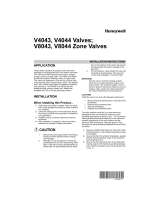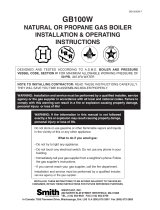
T87F ZONE THERMOSTAT AND 137421N,P WALLPLATES; T87F ZONE THERMOSTAT AND Q539A,B SUBBASES
69-0579-4 4
Q539B
The Q539B provides System switching to control damper
actuators in independent zones of heating-cooling
systems.
NOTE: The Q539B System switch must be set to the
dame position as the System switch on the ther-
mostat controlling the heating-cooling equip-
ment.
• Set the System switch to:
— Heat: When the thermostat is calling for heat, the
damper opens; when the thermostat is satisfied,
the damper closes.
— ____: The thermostat is not set to heat or cool;
the damper remains in the position (Open or
Closed) that it was in when the switch position
changed.
— Cool: When the thermostat is calling for cooling,
the damper opens; when the thermostat is satis-
fied, the damper closes.
• To change positions, use thumb and index fingers to
move the switch lever to the desired position. Place
the switch lever directly over the selected function
indicator mark.
Heat Anticipator Adjustment
The T87F Thermostat has an adjustable heat anticipator.
When the T87F is connected to a zone panel, the heat
anticipator must be set at 0.1A for correct system
operation. When the T87F is connected to a damper in
an independent zone application, the heat anticipator
must be set to 0.4A for proper system operation. See Fig.
5.
Fig. 5. Adjusting heat anticipator.
Checkout
When installation is complete, turn on the power supply
and check thermostat operation using the following
procedure. For complete checkout of entire zone system,
refer to the zone control panel installation instructions.
CAUTION
Equipment Damage Hazard.
Shorting across thermostat terminals of zone
control panels can damage heat anticipator.
Check operation using these instructions.
IMPORTANT
To assure accurate temperature control, do not
touch or breathe on the thermostat bimetal or
thermometer.
Multizone System
HEATING
1. Set each thermostat System switch to Heat and
Fan switch to Auto on the TZ-3, EMM-3, EMM-3U,
EZ-2, and EZ-4.
2. On the MM-2 and MM-3, set zone one thermostat
subbase System switch to heat and Fan switch to
Auto.
3. Turn Zone one thermostat dial 10°F (6°C) above
room temperature to call for heat.
4. Turn dials on all other zone thermostats 20°F (6°C)
below room temperature.
5. Be aware that zone one damper remains open and
all other zone dampers close. (Dampers can take
up to 30 seconds to open or close fully.)
6. Observe that furnace starts immediately and fan
starts after a short delay.
7. To check zones other than zone one, turn the dial
on one of the zone thermostats 10°F (6°C) above
room temperature to call for heat.
8. Be aware that the associated zone damper opens.
9. Turn that zone thermostat dial 10°F (6°C) below
room temperature; damper then closes.
10. Repeat steps 7-9 for each zone other than zone
one.
11. Turn zone one thermostat dial 10°F (6°C) below
room temperature to end call for heat.
12. Unless another thermostat is calling for heat, the
furnace shuts off and the fan shuts off after a short
time. All dampers then open unless set to closed
on the MM-2 or MM-3 panel.
COOLING
1. Set each thermostat System switch to Cool and
Fan switch to Auto on the TZ-3, EMM-3, EMM-3U,
EZ-2 and EZ-4.
2. On the MM-2 and MM-3, set zone one thermostat
subbase System switch to Cool and Fan switch to
Auto.
3. Turn zone one thermostat dial 10°F (6°C) below
room temperature to call for cooling.
4. Turn dials on all other zone thermostats 10°F (6°C)
above room temperature.
5. Be aware that zone one damper remains open; all
other zone dampers close. Dampers can take up to
30 seconds to open or close fully.
6. Observe that cooling and fan come on.
IMPORTANT
To prevent compressor short cycling, a mini-
mum off-time may be included to provide a five-
minute time delay before activating the com-
pressor after the thermostat last turned off the
compressor, or after the system first received
power. This delay protects the compressor.
7. To check zones other than zone one, turn the dial
on one of the zone thermostats 10°F (6°C) below
room temperature to call for cooling.
8. Be aware that the associated zone damper opens.
9. Turn that zone thermostat dial 10°F (6°C) above
room temperature; damper then closes.
10. Repeat steps 7-9 for each zone other than zone
one.
.15 .12
.2
.6
.8
1.0
.5
.4
.3
HOLE SUITABLE FOR
PENCIL POINT
TO MOVE INDICATOR
HEAT
ANTICIPATOR
INDICATOR
SCALE
M1368











